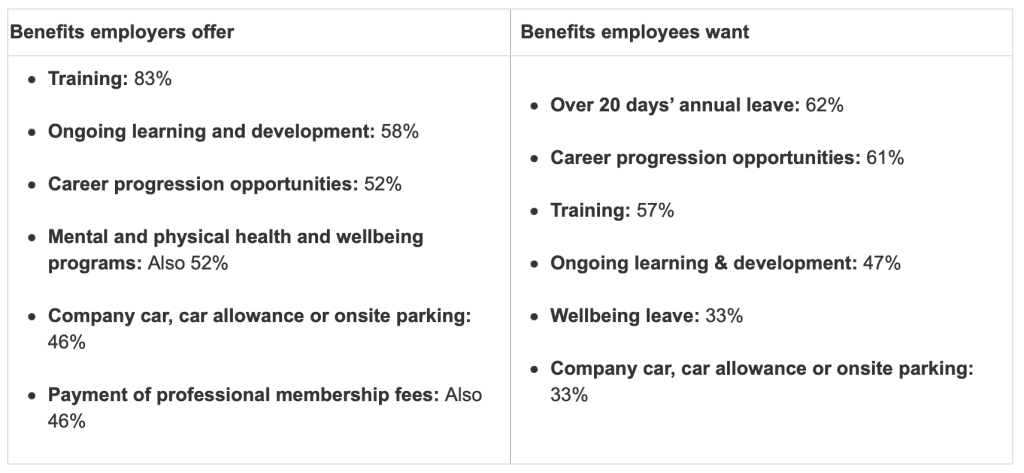July 18, 2023
With the bargaining power of employees showing little sign of weakening, almost every employer will increase salaries during the next review in New Zealand.
Equating to 95% of Kiwi organisations – up from 88% and 67% in 2022 and 2021 respectively – the collective commitment to boosting staff pay comes as skilled professionals continue to hold all the aces in a competitive talent market.
Billed as the “the great ask”, 72% of employees plan to ask for a pay rise during the next 12 months, up from 58% last year and 45% the year previously. More than two thirds (68%) admit the skills shortage has made them “more confident” to ask for a pay rise with over half (53%) believing they’d benefit financially from changing jobs.
“Employees still feel they have bargaining power and are more confident to negotiate for better pay,” said David Trollope, Managing Director of New Zealand at Hays.

According to the FY23-24 Hays Salary Guide – based on a survey of 1,904 organisations and 2,048 professionals in New Zealand – 71% of businesses plan to increase salaries above 3%, representing a “significant step up” from 37% in 2022 and 12% in 2021.
“We’re calling this the year of the raise, where the promise of higher salaries reflects the intensity of the skills shortage in today’s jobs market,” Trollope added. “This year, both the number and value of increases will rise, continuing the upwards trajectory we first noted last year.”
Despite the increased salary boost, employer and employee expectations still fail to align with many staff feeling “undervalued and underpaid”. Specifically, only 28% of Kiwis are satisfied with their current salary, with most (71%) believing it doesn’t reflect their individual performance.
In addition to employee confidence in asking for a raise, other key factors motivating employers to increase salaries during the next review include:
Specific to the battle for talent, over three quarters of employers have offered higher salaries than planned to attract skilled candidates – 22% ‘substantially higher’ and 56% ‘nominally higher’.
As a result, many professionals have already benefited from the demand for their skills through a salary increase (30%), new job (14%) or both (23%).
“Many employers find that the pipeline of skilled professionals doesn’t meet their needs,” Trollope noted. “As candidate supply continues to tighten, employers face increased pressure to proactively attract and retain talented employees.”
According to findings, almost three quarters of employers consider it reasonable to expect pay rises to keep up with inflation – 31% ‘strongly agree’ and 42% ‘agree’.
“Employers are sensitive to the hidden cost of falling real wages on employee engagement, mental health and well-being, morale and job satisfaction,” Trollope said. “While few employers can match inflationary pressures, they are stretching their salary increase budget as far as they can to support their staff.”
On the topic of pay openness, less than a third of employers are transparent with employees about how salary levels and increases are set to improve fairness and build trust – 31% are transparent with all employees and 32% with select employees.
“We expect these figures to rise in the months ahead, with the briefing into pay transparency in New Zealand prompting more employers to audit salaries, scrutinise disparities and make adjustments when required to ensure fair and equal pay,” Trollope added.
Emotional salary impact
While salary undoubtedly ranks as the most “critical factor” in attracting, rewarding and retaining employees in New Zealand, Trollope advised employers to also acknowledge the significance of benefits.
“While training, ongoing learning and development and career progression opportunities are essential components of a successful benefits program, just 27% of employees are satisfied with their current benefits,” he explained.
“They are now placing greater value on emotional salary – the intangible benefits that positively impact their emotional well-being and job satisfaction, like more than 20 days of annual leave and well-being leave.
“As benefits expand in our post-pandemic world, the emotional elements can make or break the success of your overall package.”

In a message to Kiwi employers, Trollope said the overall trend suggests that many organisations believe investing in their workforce – such as through salary increases, headcount expansions and up-skilling – is key to success.
“To stand out in the race for talent, also review the emotional elements you offer,” he noted. “Consider what else you can offer to attract and retain talent, such as opportunities for growth, well-being days, improved recognition, work-life balance or a more positive work environment.”
On the flip side, Trollope offered a statement of caution to over-confident Kiwi employees.
“With skills in demand you still have bargaining power but it’s important to temper it to avoid pricing yourself out of consideration,” he warned. “Yes, employers are investing in salary increases but margins remain tight. The commercial reality dictates that salary increases can only stretch so far.”
Instead, Trollope cited the importance of considering the “whole package” when negotiating a new job or a next pay rise.
“Your emotional salary can go a long way to bridging a possible financial expectation gap, so think about what you’d really value and what could make a difference to your life and career long-term,” he added.
Inform your opinion with executive guidance, in-depth analysis and business commentary.